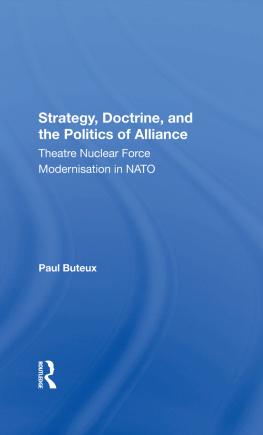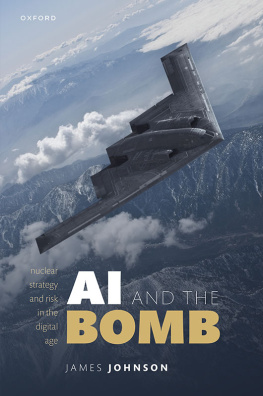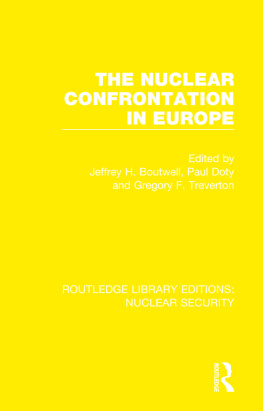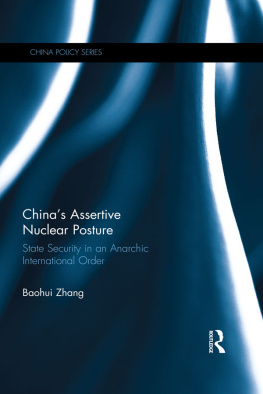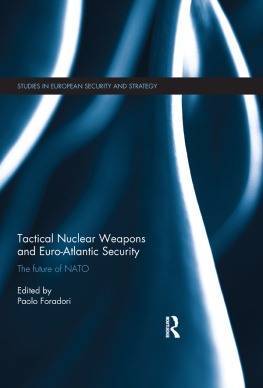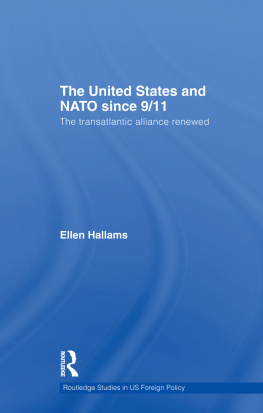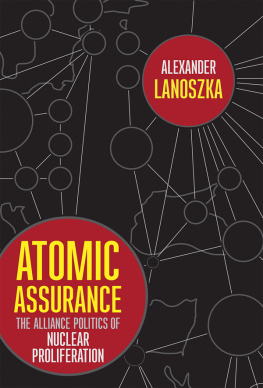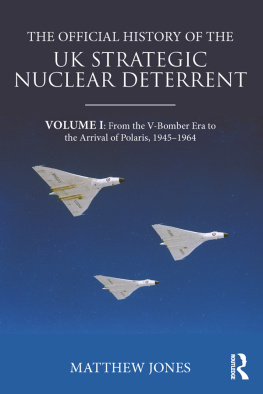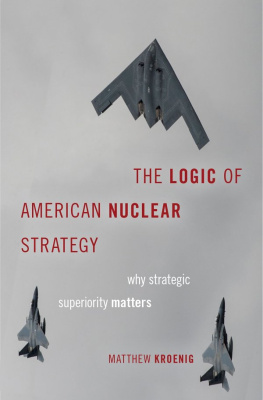Strategy, Doctrine, and the Politics of Alliance
A Westview Replica Edition
The concept of Westview Replica Editions is a response to the continuing crisis in academic and informational publishing. Library budgets for books have been severely curtailed. Ever larger portions of general library budgets are being diverted from the purchase of books and used for data banks, computers, micromedia, and other methods of information retrieval. Interlibrary loan structures further reduce the edition sizes required to satisfy the needs of the scholarly community. Economic pressures (particularly inflation and high interest rates) on the university presses and the few private scholarly publishing companies have severely limited the capacity of the industry to properly serve the academic and research communities. As a result, many manuscripts dealing with Important subjects, often representing the highest level of scholarship, are no longer economically viable publishing projects--or, if accepted for publication, are typically subject to lead times ranging from one to three years.
Westview Replica Editions are our practical solution to the problem. We accept a manuscript in camera-ready form, typed according to our specifications, and move it immediately into the production process. As always, the selection criteria include the importance of the subject, the work's contribution to scholarship, and its insight, originality of thought, and excellence of exposition. The responsibility for editing and proofreading lies with the author or sponsoring institution. We prepare chapter headings and display pages, file for copyright, and obtain Library of Congress Cataloging in Publication Data. A detailed manual contains simple instructions for preparing the final typescript, and our editorial staff is always available to answer questions.
The end result is a book printed on acid-free paper and bound in sturdy library-quality soft covers. We manufacture these books ourselves using equipment that does not require a lengthy make-ready process and that allows us to publish first editions of 300 to 600 copies and to reprint even smaller quantities as needed. Thus, we can produce Replica Editions quickly and can keep even very specialized books in print as long as there is a demand for them.
About the Book and Author
Strategy, Doctrine, and the Politics of Alliance: Theatre Nuclear Force Modernisation in NATO
Paul Buteux
This book examines the processes of nuclear policymaking in NATO and the interaction of alliance strategy with the docrines underlying it. Dr. Buteux focuses on the issue of theatre nuclear force modernisation to illustrate his thesis that NATO's strategic posture results from a political process in which other than purely strategic objectives are sought; agreements on alliance strategy may in fact be related only indirectly to the actual military posture of the alliance and the means available to support it.
The book highlights the cumulative effect of strategic and technological change on the strategy and nuclear politics of NATO. Emphasizing that the present strategic environment has called into question many of the strategic and political premises on which NATO's nuclear posture has been based, Dr. Buteux gives special attention to recent proposals to deploy enhanced-radiation weapons (the "neutron bomb") and new intermediate-range nuclear weapons in Europe. He considers the impact of these proposals on NATO's nuclear policymaking process and on the ability of the alliance to continue to base its deterrent posture on the concept of flexible response.
Dr. Buteux is associate professor in the Department of Political Studies at the University of Manitoba. He is author of The Politics of Nuclear Consultation in NATO, 1965-1980.
Strategy, Doctrine, and the Politics of Alliance
Theatre Nuclear Force Modernisation in NATO
Paul Buteux
First published 1983 by Westview Press, Inc.
Published 2019 by Routledge
52 Vanderbilt Avenue, New York, NY 10017
2 Park Square, Milton Park, Abingdon, Oxon OX14 4RN
Routledge is an imprint of the Taylor & Francis Group, an informa business
Copyright 1983 Taylor & Francis
All rights reserved. No part of this book may be reprinted or reproduced or utilised in any form or by any electronic, mechanical, or other means, now known or hereafter invented, including photocopying and recording, or in any information storage or retrieval system, without permission in writing from the publishers.
Notice:
Product or corporate names may be trademarks or registered trademarks, and are used only for identification and explanation without intent to infringe.
Library of Congress Cataloging in Publication Data
Buteux, Paul.
Theatre nuclear force modernisation in NATO.
(A Westview Replica Edition)
Bibliography: p.143 Index: p.153
1. North Atlantic Treaty Organization. 2. Atomic weapons.
3. Ballistic missiles. 4. Cruise missiles. 5. Europe--Defenses.
I. Title. II. Series.
UA646.3.B77 1982 355'.031'091821 82-20024
ISBN 13: 978-0-367-28893-8 (hbk)
This study was undertaken initially with the assistance of a NATO Fellowship awarded in 1979 Not only did the fellowship enable me to travel to Brussels and other NATO capitals, but it also opened doors to persons in official positions who might otherwise have been reluctant to speak to me with the frankness and candour that in fact I experienced. An undertaking of this kind, dealing as it does with highly sensitive current issues, would be very difficult, if not impossible, were it not for the willingness of many people in national capitals and in NATO Headquarters to offer me their confidence. To all those who did so I wish to extend my thanks. In particular, I wish to acknowledge the courtesy and helpfulness of Dr. Fernand Welter of the NATO Information Directorate in his administration of the Fellowship. I also wish to acknowledge the assistance provided by the award of a Department of National Defence Fellowship administered by the Association of Universities and Colleges of Canada. This enabled me to do further work on problems associated with theatre nuclear weapons while on leave from the University of Manitoba in 1980-81. While on leave, a visiting fellowship at the Centre for International Studies at the London School of Economics provided me with a congenial and stimulating environment in which to work. The support of the Research Board of the University of Manitoba greatly assisted in the preparation of the manuscript, and Anupam Sharma did the bulk of the work involved in the preparation of the index.
Because of their official positions it would be inappropriate to name many of those who gave me the benefit of their time, knowledge and advice. I can, however, acknowledge the assistance of three friends and colleagues; Hugh Macdonald, Robin Ranger and Philip Windsor, with whom I have spent many hours discussing problems of NATO and European security. Nevertheless, as always, in the end the responsibility for what an author writes lies with him alone.
Each of the four chapters that make up this book is relatively self-contained and can he read seperately; nonetheless, they each represent aspects of the general theme suggested by the title. Each discusses various elements of alliance strategy, the doctrines that underlie it, and the politics of nuclear policy-making in NATO; each chapter was occasioned by reflections on the implications of theatre nuclear force modernisation for the alliance, and each attempts to illustrate something of the interaction of politics and nuclear strategy in NATO. I have been concerned in these essays to examine the issue of theatre nuclear force modernisation as a political problem. Too often, it seems to me, a great deal of the technical analysis that has been applied to the problems of NATO strategy ignores or at least underplays the political elements contained within it, and in this respect the modernisation of the alliance's theatre nuclear forces has been no exception. What I have sought to demonstrate in what follows is that theatre nuclear force modernisation is something more than the application of technological solutions to military and strategic difficulties, and that the strategic doctrines that provide a rationale for the deployment of such new weapons serve additional purposes than simply relating technological means to military purposes.

